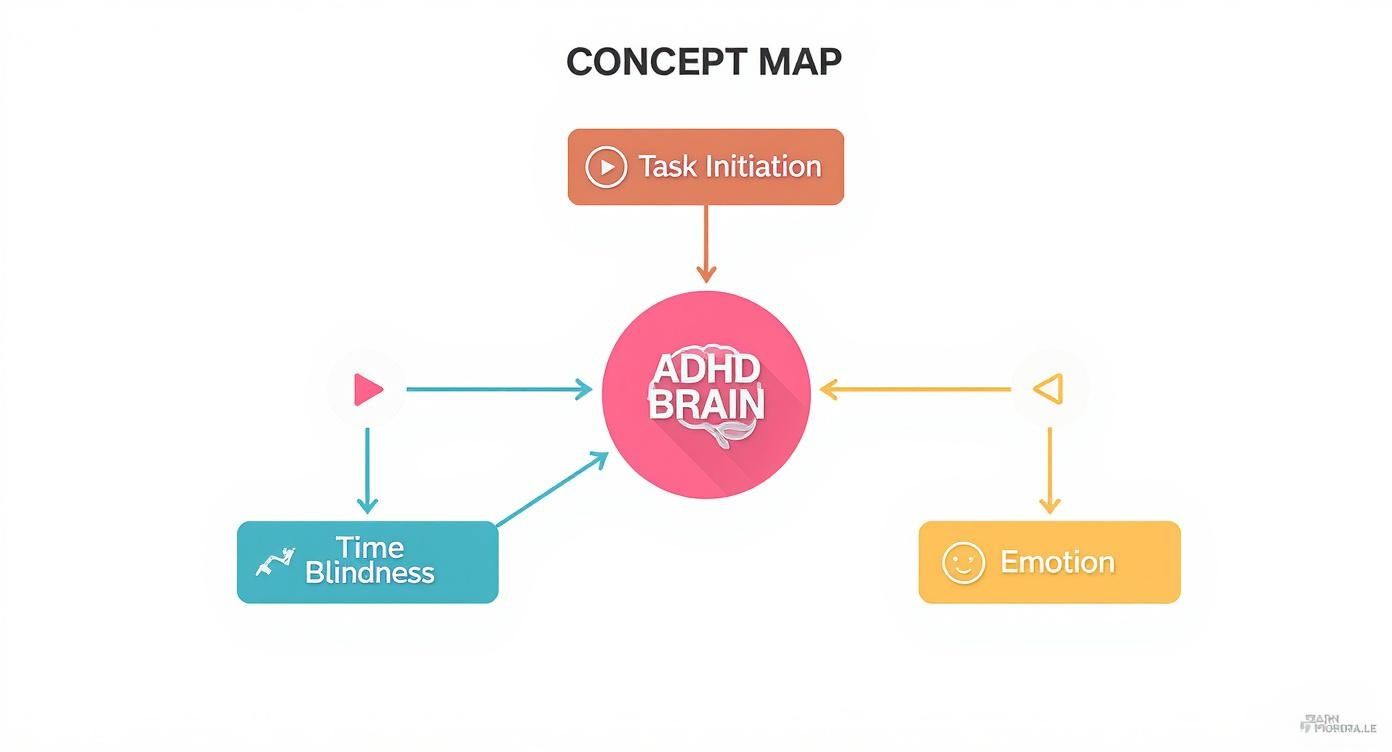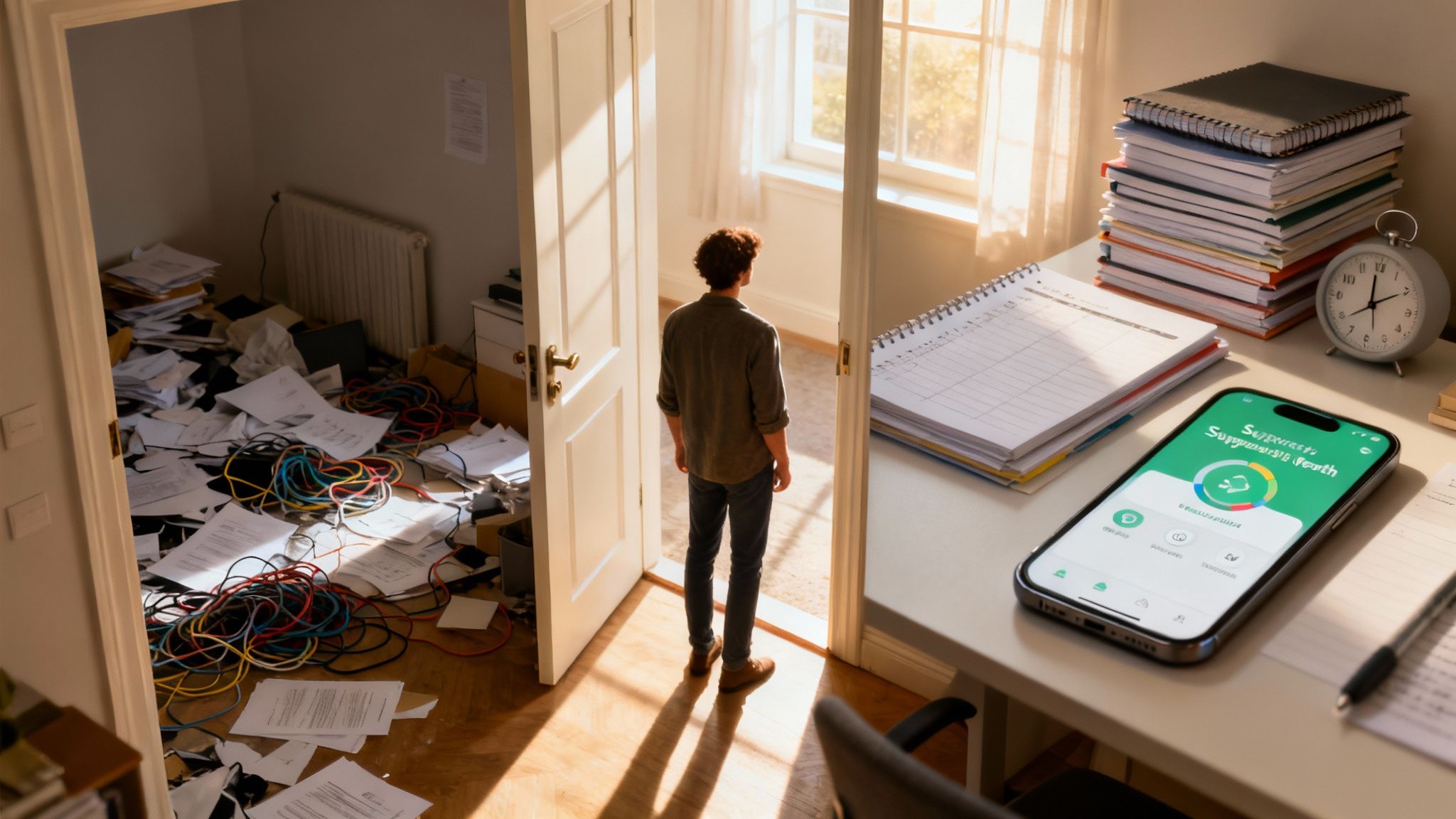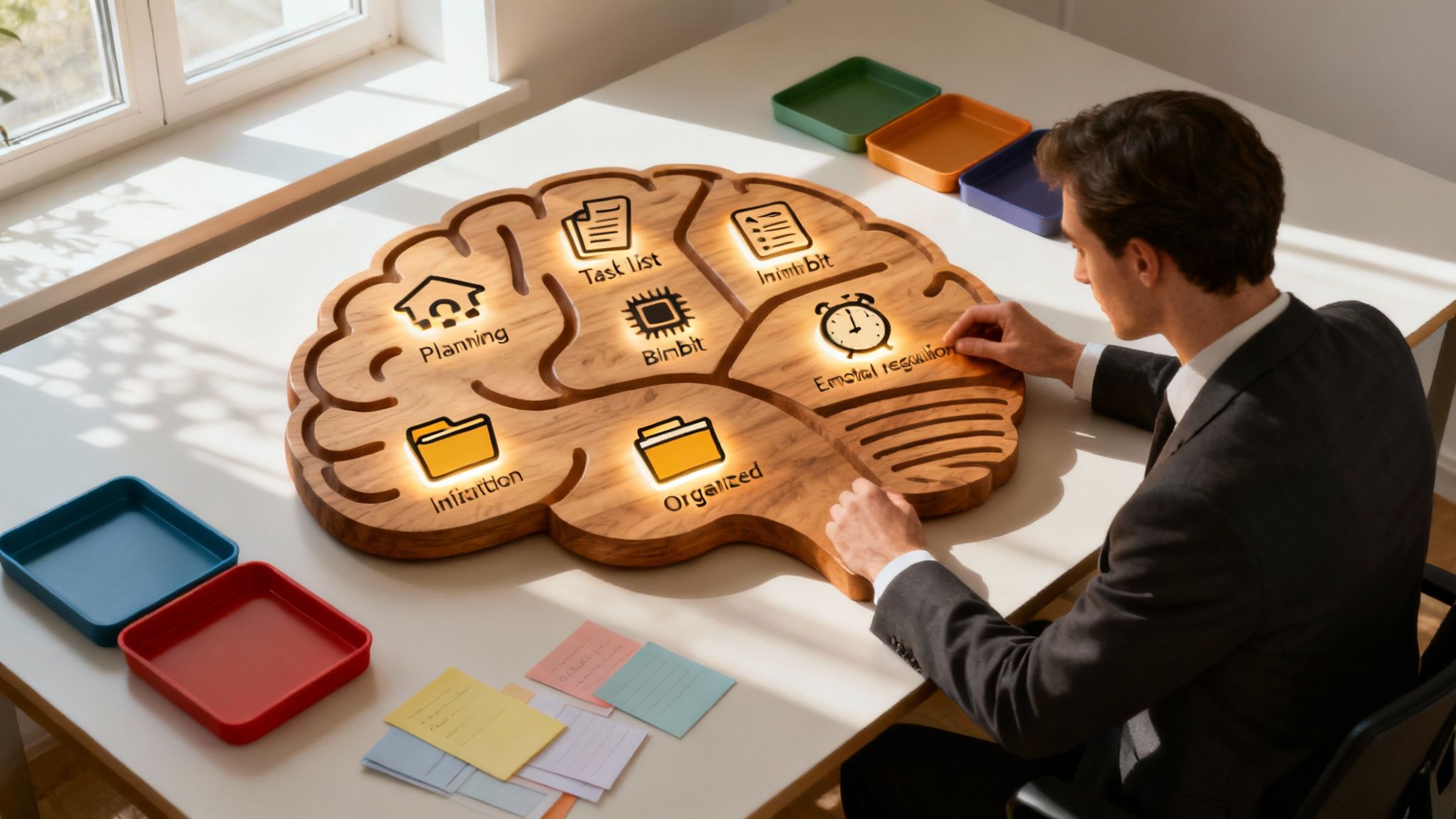Ever set a goal with fiery determination, only to watch it fizzle out a few days later? If you have, you know the unique frustration of what feels like a total lack of discipline. You might find yourself thinking, "Why can't I just do the things I know I need to do?"
Here’s a truth that might feel like a relief: that experience isn't a sign that you're lazy or broken. It’s usually a signal that the strategies you're using just aren't clicking with your brain's unique wiring. Let's explore what's really going on.
What's Really Behind a Lack of Discipline?

It’s a story most of us know by heart. You commit to a new routine, but within days, you’re right back to your old habits, maybe even feeling a wave of guilt. This cycle can easily convince you that discipline is some innate character trait you were just born without.
But here's a more scientific, and kinder, perspective.
🔬 Scientific Takeaway: What we call "discipline" is actually a complex set of skills managed by our brain's executive functions—the mental control center responsible for planning, focusing, regulating emotions, and starting tasks.
When those functions are strained, "just trying harder" is like trying to run a power-hungry app on a phone with 1% battery. It's not a matter of willpower; it's a matter of capacity.
Beyond the "Willpower" Myth
Plenty of things can drain your executive function battery, making consistent action feel next to impossible. For neurodivergent people, especially those with ADHD, these challenges are often magnified due to differences in brain structure and neurochemistry.
One of the biggest, and most overlooked, reasons for a dip in self-discipline is the significant effects of sleep deprivation on both your mind and body.
Other common drains on your mental battery include:
- Decision fatigue: Making too many choices all day long exhausts your mental resources.
- Emotional overwhelm: Intense feelings can hijack your focus and completely derail the best-laid plans.
- Lack of clarity: Vague goals without a clear "why" make it incredibly hard to stay motivated.
This constant struggle isn't a moral failure. It’s a sign that you need a different approach—one that works with your brain, not against it.
Understanding these underlying patterns is the very first step toward building systems that actually stick. Instead of forcing yourself to use neurotypical productivity hacks that never seem to fit, you can learn to create compassionate, science-backed strategies that honor how you think.
This is exactly where tools like the Inflow app can make a real difference. Inflow is designed to help you understand your brain and build skills that last. Get started by taking our ADHD quiz to gain personalized insights into your unique patterns.
Why 'Just Trying Harder' Doesn't Work
If you've ever felt stuck in a loop of setting goals, falling short, and then blaming your own “lack of discipline,” you’ve come face-to-face with the myth of willpower. Society often frames discipline as a moral muscle—either you’re strong enough, or you’re not. This idea isn't just inaccurate; it can be incredibly damaging.
The reality is that discipline isn't some fixed character trait. It’s a complex toolkit of brain skills—your executive functions. Think of these functions as your mind’s CEO, in charge of planning, managing emotions, and, crucially, just getting started.
Imagine your executive functions are like a smartphone battery. Every decision you make, every emotional impulse you manage, and every moment of stress drains a little bit of that charge.
The Myth of Endless Willpower
When you're constantly battling decision fatigue, burnout, or emotional overwhelm, that mental battery plummets. In that state, telling yourself to "just try harder" is like demanding your phone stream a movie in high-def on 1% power. It's simply not going to work.
You might recognize yourself in this pattern, especially if you have a neurodivergent brain. ADHD brains, for instance, often run on a different "operating system." They can be more sensitive to stress and require more stimulation to stay engaged, which drains that executive function battery even faster. (You can read more about this in our article on ADHD and dopamine-seeking behavior.)
This relentless cycle of trying and failing doesn’t build character; it builds shame. It tricks you into believing the problem is your effort when it’s actually your strategy.
Shifting your perspective is the first real step. Your brain isn’t broken; it just needs a different instruction manual. Forcing neurotypical productivity hacks onto a neurodivergent mind is like trying to run Mac software on a Windows PC—it's destined to crash.
How Your Brain's Operating System Works
Once you start to understand your own unique wiring, you can stop fighting against yourself and start building strategies that actually align with how you think. It’s about figuring out what drains your battery and, just as importantly, what recharges it.
💡 Key Insight: Real discipline isn't about brute force. It’s about creating systems and environments that take the load off your executive functions, making it easier to do the things that matter to you.
This shift from self-blame to self-understanding is the foundation for building habits that actually stick. It’s about working with your brain, not waging a war against it. Have you noticed this pattern in your own life?
The ADHD Link to Discipline Challenges
Have you ever stared at a simple task, like loading the dishwasher, and felt an invisible wall holding you back? If so, you’ve felt the frustrating reality of the ADHD brain. What looks like a “lack of discipline” from the outside is often a direct result of how our brains are wired. It's not a personal failure; it's a neurobiological difference.
Realizing this can be incredibly empowering. It’s that "aha!" moment where lifelong struggles suddenly click into place. It helps you shift from self-blame to self-awareness, recognizing that these challenges aren't character flaws—they're just features of how your brain operates.
The Science Behind the Struggle
At the heart of it all is executive dysfunction, a term for challenges with the brain's self-management system. These are the skills that control everything from starting a task to managing your emotions. If you want to go deeper, you can explore the relationship between executive dysfunction and ADHD in our guide.
For people with ADHD, three key features often get in the way of what most people think of as discipline:
- Task Initiation Paralysis: This is the profound difficulty of just starting. The mental energy it takes to begin a task, especially a boring one, can feel monumental. It leads to procrastination that looks like laziness but is really a neurological hurdle.
- Time Blindness: Do you consistently underestimate how long an errand will take? That’s "time blindness," a common ADHD trait where the brain struggles to perceive the passage of time accurately. It can make planning and meeting deadlines feel almost impossible.
- Emotional Dysregulation: Intense feelings can completely hijack your focus. The ADHD brain often feels emotions more powerfully, so a single moment of frustration or anxiety can derail an entire day's worth of plans.
Seeing these patterns as symptoms of ADHD, rather than personal shortcomings, is the first step toward finding strategies that actually work. It’s about building a support system for your brain, not forcing it to operate in a way it wasn't designed for.
From School Struggles to Adult Challenges
These neurological traits often cause friction in environments built for neurotypical minds. This is especially true in school, where a perceived lack of discipline can have serious consequences. Research shows that exclusionary practices in schools tend to impact students with disabilities the hardest. With over 80% of U.S. public schools reporting negative impacts on student behavior post-pandemic, students with disabilities are facing higher rates of suspension and expulsion. You can learn more about how discipline affects students with disabilities from recent findings.
These early experiences can cement a lifelong narrative of being "undisciplined." But realizing the problem isn't a lack of willpower—but a need for different tools—is liberating. It opens the door to building skills that work with your brain, which is the entire foundation of the Inflow app.
Have you noticed these patterns in your own life? Recognizing them is the start of your journey toward compassionate, effective self-management.
Your Practical Toolkit for Building Self-Discipline
So, understanding why you struggle with discipline is a huge first step. It's empowering. But the real game-changer is turning that knowledge into action. This is where we get practical with concrete, ADHD-friendly strategies. Forget vague advice like "just try harder." This toolkit is built to work with your brain's unique wiring.
This concept map helps visualize how core ADHD traits—like trouble starting tasks, time blindness, and emotional rollercoasters—are all interconnected. They aren't isolated problems; they're part of a bigger brain-based system.

What this shows us is that a so-called "lack of discipline" often comes down to these neurological hurdles. That means we need targeted strategies, not just more willpower.
Break It Down with Task Chunking
Overwhelm is the enemy of action. When a task feels massive, the ADHD brain tends to shut down, leading to that all-too-familiar cycle of paralysis and procrastination.
The antidote? Task chunking. It's as simple as it sounds: break down a huge, scary project into the smallest, most ridiculously tiny steps you can think of.
Instead of adding "clean the kitchen" to your list (a recipe for overwhelm), try this:
- ✅ Clear one counter.
- ✅ Put five dishes in the dishwasher.
- ✅ Wipe down the stove.
Each small task feels doable. When you check it off, you get a small dopamine hit, which builds momentum. You're proving to your brain that you can do this, one tiny step at a time. The goal isn't to be perfect; it's just to keep moving forward.
Create Triggers with Habit Stacking
Trying to build a brand new habit from scratch takes a ton of mental energy. Habit stacking is a shortcut. You piggyback a new habit you want to build onto a routine you already do without thinking.
💡 For example:
- Existing Habit: Making your morning coffee.
- New Habit: Taking your daily vitamins.
- Habit Stack: "After I turn on the coffee maker, I will take my vitamins."
By linking the new habit to one that's already locked in, you don't have to rely on memory or motivation. The old habit becomes the automatic trigger for the new one.
Use External Aids for Support
Let's be real: your environment can be your best friend or your worst enemy. Instead of trying to rely on your internal memory and motivation (which can be super flaky), use external tools to do the heavy lifting for you.
The key is to create a "scaffolding" system around yourself that makes it easier to do the right thing and harder to get sidetracked. This isn't a crutch; it's a smart strategy for supporting your executive functions.
Here are some practical aids that often work for ADHD brains:
- Visual Timers: These make time feel real and tangible, which is a lifesaver for "time blindness." Techniques like the Pomodoro method are amazing for this. You can learn more about how the Pomodoro Technique helps with ADHD in our detailed guide.
- Strategic Reminders: Go wild with sticky notes, phone alarms, or calendar alerts. The trick is to place them exactly where you'll need to see them at the exact right moment.
- Digital Planners: To seriously manage your schedule and build consistency, finding the best daily planner app can be a crucial piece of your practical toolkit.
These aren't just organizational tools. They’re about creating a world that's set up to help your brain succeed. The Inflow app bakes a lot of these principles right in, giving you daily, guided support to build these skills until they stick.
Have you ever tried breaking down a task so small it felt silly? That's usually the perfect place to start.
Moving From Self-Criticism to Self-Compassion

It’s an exhausting cycle, isn't it? You put something off, miss a deadline, and then your inner critic arrives right on cue, calling you lazy and undisciplined. That voice feels productive—like you’re giving yourself the tough love you need to get back on track.
But it’s actually the opposite. Punishing yourself for a perceived "lack of discipline" just floods your brain with anxiety and shame, which only fuels more avoidance.
The more you beat yourself up, the bigger and scarier the task becomes, making it even more likely you’ll procrastinate again. This pattern is common among people with ADHD and is sometimes called an ADHD shame spiral, where one setback triggers an avalanche of negative self-talk.
Breaking this cycle means making a radical shift in how you talk to yourself—moving from self-criticism to self-compassion.
Adopting a Gentle Approach for Yourself
Think about how gentle parenting works. Kids (and adults!) thrive on positive reinforcement and understanding, not fear and punishment. The same principle applies to your internal monologue. Your brain is far more likely to cooperate when it feels supported and safe, not under attack.
Globally, research confirms the harm of punitive methods. Studies show that harsh discipline is not only ineffective but can be damaging to long-term well-being. You can learn more about this and why non-violent discipline methods are more effective from the World Health Organization.
Just as this approach damages development, a punitive inner voice sabotages your own motivation. So instead of being a harsh critic, what if you became your own supportive coach?
Treat setbacks as data, not as evidence of your failure. A missed goal isn’t a moral failing; it’s a piece of information. It’s telling you that your strategy might need a tweak, the task needs to be smaller, or your mental battery is simply running on empty.
Create Your Own Dopamine Menu
To nurture this compassionate approach, you need to celebrate your wins—no matter how small they seem. One of the best ways to do this is by creating a "dopamine menu."
This is simply a personalized list of small, genuinely rewarding things you can do right after completing a task. The key is to choose rewards that replenish your energy, not drain it further.
💡 Your Dopamine Menu Might Include:
- Blasting one of your favorite songs.
- Stretching for five minutes by a sunny window.
- Sending a quick, funny meme to a friend.
- Sipping a favorite tea or coffee without any other distractions.
This isn’t about bribing yourself. It's about giving your brain the positive feedback it needs to build new habits. Each time you finish a small task and follow it up with a genuine reward, you’re training your brain to connect effort with good feelings. Slowly but surely, you'll start to dismantle that old, painful cycle of shame and avoidance.
Have you ever thought about what small, joyful activities could go on your personal dopamine menu?
How Inflow Supports Your Journey
Understanding the why behind your discipline struggles is a huge first step. But putting that knowledge into practice? That can be a challenge. This is where the rubber meets the road, and it’s often where people get stuck.
Instead of trying to figure it all out on your own, the Inflow app acts as a coach in your pocket. It’s designed to give you the structure and support you need to turn theory into sustainable, real-world habits.
Inflow gets right to the heart of the executive function challenges we've been talking about. It’s not about finding more willpower; it’s about building practical skills. The app translates proven clinical strategies, like Cognitive Behavioral Therapy (CBT), into small, everyday actions you can start using right away.
A Personalized Path to Progress
Inside, you’ll find a library of learning modules that help you reframe those sticky, negative thoughts about your "lack of discipline." The goal is to swap that harsh inner critic for genuine self-compassion, which is the real fuel for growth.
Inflow also gives you specific tools and exercises for common ADHD hurdles:
- Time Management Tools: To help you fight back against “time blindness” and plan your days in a way that actually works.
- Emotional Regulation Guides: To support you when intense feelings threaten to throw your whole day off track.
- Daily Focus Goals: To help you chop up overwhelming projects into small, satisfying wins.
The secret is building momentum through consistency, not perfection. Inflow provides the tools to create systems that work with your brain, offering daily support and accountability to keep you moving forward.
Think of it as a guided journey to help you apply these strategies consistently in your life. Ready to see what that could look like for you? Take the Inflow quiz today to get a personalized look at your unique challenges and see how the app can guide your journey.
Answering Your Questions About Discipline
Let's dig into some of the questions that often come up when people start looking at discipline in a new, more compassionate way.
How do I know if it’s laziness or ADHD?
This is a big one. Laziness is a choice or a temporary feeling. ADHD-related challenges, however, are persistent patterns. They show up consistently across multiple areas of your life—work, home, relationships—over a long period, despite your best efforts to change.
If you read that and thought, "Yep, that sounds familiar," getting a professional opinion is a great next step. The Inflow quiz can be a helpful starting point for understanding your own unique patterns.
Can I build discipline without medication?
Absolutely. While medication can be a powerful tool for many people with ADHD, it’s rarely the whole picture. Think of it as just one part of a bigger, more holistic plan.
Skill-building strategies, techniques from Cognitive Behavioral Therapy (CBT), and lifestyle adjustments are the foundation for managing ADHD. These methods can be incredibly effective on their own, or they can work alongside medication to support real, long-term growth.
What is the most important first step I can take?
Start with two things: self-compassion and one incredibly small first step. Seriously, tiny.
Pick one single action that feels almost laughably easy, and focus only on doing that one thing consistently. This approach is all about building self-trust and momentum. You're proving to your brain, one small win at a time, that change is actually possible.






